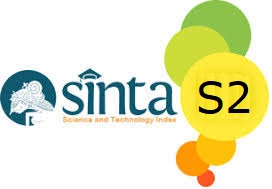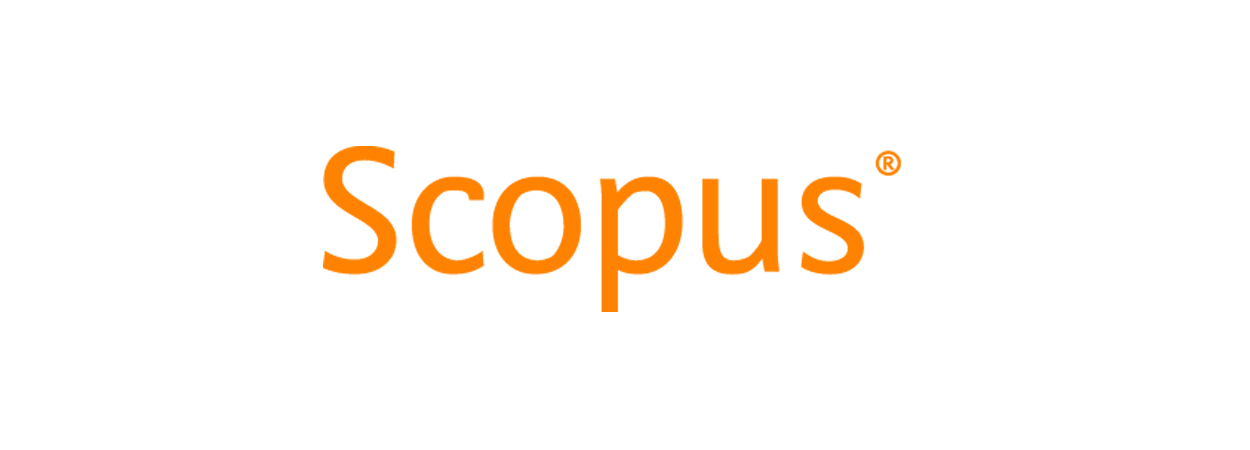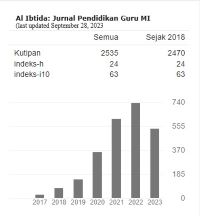Model-Eliciting Activities on Students' Mathematical Literacy by Reviewing Differences in Self-Regulated Learning
(1) Universitas Muhammadiyah Sidoarjo
(2) Universitas Muhammadiyah Sidoarjo
(3) Universitas Muhammadiyah Sidoarjo
(4) Universiti Malaya
(*) Corresponding Author
Abstract
Abstract
The mathematical literacy of students is still relatively low. However, it remains a goal and a necessity to develop mathematical literacy as a fundamental skill for solving problems in various contexts, particularly in formulating, employing, and interpreting mathematics. Previous studies have proven that model-eliciting activities effectively enhance mathematical literacy. On the other hand, mathematical literacy is influenced by differences in self-regulated learning. Therefore, this study answers whether implementing model-eliciting activities regarding self-regulated learning differences affects students' mathematical literacy. This study employed a quasi-experimental non-equivalent pretest and posttest design that involved 55 fourth-grade primary students. Data collection used a mathematical literacy test and a self-regulated learning questionnaire. The levels of self-regulated learning were categorised as low, medium, and high. The data analysis was a two-way analysis of variance test followed by the Tukey test. The study showed that implementing model-eliciting activities by considering differences in self-regulated learning affected students' mathematical literacy. Another finding is that students with high self-regulated learning are better at mathematical literacy than those with low self-regulated learning.
Keywords: model-eliciting activities, mathematical literacy, self-regulated learning.
Abstrak
Literasi matematika siswa masih tergolong rendah, namun sampai saat ini masih menjadi tujuan dan kebutuhan sebagai keterampilan fundamental untuk menyelesaikan masalah dalam berbagai konteks khususnya dalam hal merumuskan, menggunakan, dan menafsirkan matematika. Peneliti-peneliti sebelumnya telah membuktikan model-eliciting activities efektif untuk meningkatkan literasi matematika. Disisi lain, literasi matematika dipengaruhi oleh perbedaan self-regulated learning. Oleh karena itu, penelitian menjawab rumusan masalah mengenai apakah implementasi model-eliciting activities dengan memperhatikan perbedaan self-regulated learning berpengaruh terhadap literasi matematika siswa. Penelitian ini menggunakan quasi eksperimental non-equivalent pretest dan posttest desain dengan melibatkan 55 siswa kelas empat sekolah dasar. Pengumpulan data menggunakan tes literasi matematika dan kuisioner self-regulated learning. Perbedaan tingkat self-regulated learning dikategorikan sebagai rendah, sedang, dan tinggi. Analisis data yang digunakan adalah uji analisis varians dua arah dan dilanjutkan uji Tukey. Temuan penelitian menunjukkan implementasi model-eliciting activities dengan memperhatikan perbedaan self-regulated learning berpengaruh terhadap literasi matematika siswa. Temuan lainnya adalah siswa yang memiliki self-regulated learning tinggi lebih baik dalam literasi matematika dibanding siswa yang memiliki self-regulated learning rendah.
Keywords: model-eliciting activities, literasi matematika, self-regulated learning.
Full Text:
PDFReferences
Ansari, B. I., Saleh, M., Nurhaidah, & Taufiq. (2021). Exploring students’ learning strategies and self-regulated learning in solving mathematical higher-order thinking problems. European Journal of Educational Research, volume-10-(volume-10-issue-2-april-2021), 743–756. https://doi.org/10.12973/eu-jer.10.2.743
Arianto, F., & Hanif, M. (2024). Evaluating metacognitive strategies and self-regulated learning to predict primary school students’ self-efficacy and problem-solving skills in science learning. Journal of Pedagogical Research, 8(3), 301–319. https://doi.org/10.33902/JPR.202428575
Battaglia, M. V., Melchiori, F. M., Battaglia, M. V., & Melchiori, F. M. (2025). Enhancing teacher self-efficacy through self-regulated learning and visualisation strategies: A pilot study in initial teacher education. QTimes Webmagazine. https://doi.org/10.14668/QTimes_17132
Bednorz, D., & Bruhn, S. (2023). Influence of primary students’ self-regulated learning profiles on their rating of a technology-enhanced learning environment for mathematics. Frontiers in Psychology, 14(April). https://doi.org/10.3389/fpsyg.2023.1074371
Chamberlin, S. A., & Moon, S. M. (2005). Model-eliciting activities as a tool to develop and identify creatively gifted mathematicians. The Journal of Secondary Gifted Education, 17(1), 37–47. https://doi.org/10.4219/jsge-2005-393
Chimmalee, B., & Anupan, A. (2022). Effect of model-eliciting activities using cloud technology on the mathematical problem-solving ability of undergraduate students. International Journal of Instruction, 15(2), 981–996. https://doi.org/10.29333/iji.2022.15254a
Cresswell, J. W., & Cresswell, J. D. (2018). Research design qualitative, quantitative, and mixed methods approaches fifth edition. In S. H (Ed.), SAGE publications, Inc. (Fifth Edit). SAGE Publications, Inc. https://doi.org/10.4324/9780429469237-3
De Ruig, N. J., De Jong, P. F., & Zee, M. (2023). Stimulating elementary school students’ self-regulated learning through high-quality interactions and relationships: A narrative review. Educational Psychology Review, 35(3), 1–34. https://doi.org/10.1007/s10648-023-09795-5
Gabriel, Florence, Buckley, Sarah, & Barthakur, Abhinava. (2020). The impact of mathematics anxiety on self-regulated learning and mathematical literacy. Australian Journal of Education, 64(3), 227–242. https://doi.org/10.1177/0004944120947881
Harahap, L. E. S., Andayani, S., & Ekwan, D. (2025). How does self-regulated learning affect students’ mathematics anxiety ? Pedagogical Research, 10(1), 1–15. https://doi.org/10.29333/pr/15648
Hartati, S., Bilqis, R. A., & Rinaldi, A. (2020). Mathematical problem-solving abilities and reflective thinking abilities: The impact of the influence of eliciting activities models. In Al-Jabar : Jurnal Pendidikan Matematika (Vol. 11, Issue 1). https://dx.doi.org/10.24042/ajpm.v11i1.6709
Holenstein, M., Bruckmaier, G., & Grob, A. (2021). Transfer effects of mathematical literacy: an integrative longitudinal study. European Journal of Psychology of Education, 36(3), 799–825. https://doi.org/10.1007/s10212-020-00491-4
Huang, J., Cai, Y., Lv, Z., Huang, Y., & Zheng, X. L. (2024). Toward self-regulated learning: effects of different types of data-driven feedback on pupils’ mathematics word problem-solving performance. Frontiers in Psychology, 15(October), 1–14. https://doi.org/10.3389/fpsyg.2024.1356852
Huffman, T. J., & Mentzer, N. (2021). The impact of modeling-eliciting activities on high school student design performance. International Journal of Technology and Design Education, 31(2), 255–280. https://doi.org/10.1007/s10798-019-09557-x
Jung, H., & Brady, C. (2025). Modeling actions foregrounded in whole-class modeling discourse: A case study of a model-eliciting activity and a three-act task. Mathematical Thinking and Learning, 27(1), 1–24. https://doi.org/10.1080/10986065.2023.2180849
Karlen, Y., Bäuerlein, K., & Brunner, S. (2024). Teachers’ assessment of self-regulated learning: Linking professional competences, assessment practices, and judgment accuracy. In Social Psychology of Education (Vol. 27, Issue 2). Springer Netherlands. https://doi.org/10.1007/s11218-023-09845-4
Kehi, Y. J., & Naimnule, M. (2023). Development of teaching materials with eliciting activities models based on ethnomathematics to improve mathematical literacy ability. Jurnal Eduscience, 10(1), 51–61. https://doi.org/10.36987/jes.v10i1.4013
Khotimah, S. H., Budi, A. S., & Sumantri, M. S. (2019). Improving mathematical literacy ability of llementary school students through a field trip learning. Al Ibtida: Jurnal Pendidikan Guru MI, 6(2), 219. https://doi.org/10.24235/al.ibtida.snj.v6i2.5014
Lee, M., Lee, S. Y., Kim, J. E., & Lee, H. J. (2023). Domain-specific self-regulated learning interventions for elementary school students. Learning and Instruction, 88(July), 101810. https://doi.org/10.1016/j.learninstruc.2023.101810
Li, J., Ling, L., & Tan, C. W. (2021). Blending peer instruction with just-in-time teaching: Jointly optimal task scheduling with feedback for classroom flipping. Proceedings of the Eighth ACM Conference on Learning @ Scale, 117–126. https://doi.org/10.1145/3430895.3460134
Mei, M. F., Wondo, M. T. S., Seto, S. B., & Meke, K. D. P. (2022). Penggunaan model eleciting activities (MEAs) dalam meningkatkan hasil belajar ditinjau dari self confidence pada materi aritmatika. Aksioma: Jurnal Program Studi Pendidikan Matematika, 11(3), 1768. https://doi.org/10.24127/ajpm.v11i3.5436
Mejeh, M., & Held, T. (2022). Understanding the development of self-regulated learning: An intervention study to promote self-regulated learning in vocational schools. In Vocations and Learning (Vol. 15, Issue 3). Springer Netherlands. https://doi.org/10.1007/s12186-022-09298-4
Monica, B., Wibowo, S. E., & Harsono, A. M. B. (2023). The challenges of literacy culture in the digital era: The role of fairy tales through the country in improving literacy and numerical literacy. Al Ibtida: Jurnal Pendidikan Guru MI, 10(2), 265. https://doi.org/10.24235/al.ibtida.snj.v10i2.12412
Mubarokah, A. A. L., & Amir, M. F. (2024). Primary students’ errors in solving mathematical literacy problems based on newman analysis. Mathematics Education Journal, 18(2), 217–230. https://doi.org/10.22342/jpm.v18i2.pp217-230
Nisa, F. K., & Arliani, E. (2023). Junior high school students’ mathematical literacy in terms of mathematical self-efficacy. Jurnal Elemen, 9(1), 283–297. https://doi.org/10.29408/jel.v9i1.7140
OECD. (2023). PISA 2022 Results (Volume I): The state of learning and equity in education, PISA, OECD Publishing, Paris,. https://doi.org/10.1787/53f23881-en
Oudman, S., van de Pol, J., & van Gog, T. (2022). Effects of self-scoring their math problem solutions on primary school students’ monitoring and regulation. Metacognition and Learning, 17(1), 213–239. https://doi.org/10.1007/s11409-021-09281-9
Özbek, G., & Cho, S. (2022). Effects of mathematical modelling based project production and management program on gifted students’ mathematical modelling and reflective thinking for real-life problem solving. Gifted Education International, SAGE Publications Ltd, 39(3), 318–336. https://doi.org/10.1177/02614294221118005
Putri, H. E., Muqodas, I., Sasqia, A. S., Abdulloh, A., & Yuliyanto, A. (2020). Increasing self-regulated learning of elementary school students through the concrete-pictorial-abstract approach during the COVID-19 pandemic. Premiere Educandum : Jurnal Pendidikan Dasar Dan Pembelajaran, 10(2), 187. https://doi.org/10.25273/pe.v10i2.7534
Rufiana, I. S., Arifin, S., Randy, M. Y., & Amaliya, F. N. (2024). Analysis of student errors in solving numeracy literacy problems of graph representation model in elementary school. Al Ibtida: Jurnal Pendidikan Guru MI, 11, 300–319. http://dx.doi.org/10.24235/al.ibtida.snj.v11i2.18720
Runtu, P. V. J., Pulukadang, R. J., Mangelep, N. O., Sulistyaningsih, M., & Sambuaga, O. T. (2023). Student’s mathematical literacy: A study from the perspective of ethnomathematics context in North Sulawesi Indonesia. Journal of Higher Education Theory and Practice, 23(3), 57–65. https://doi.org/10.33423/jhetp.v23i3.5840
Sari, N., Dewi, I., & Surya, E. (2020). Development of learning devices based on model eliciting activities to improve students problem solving ability and mathematical disposition. Journal of Education and Practice, 1, 122–128. https://doi.org/10.7176/jep/11-3-12
Sari, N., Nuraeni, Z., & Sukmaningthias, N. (2022). Interaction between RME-based blended learning and self-regulated learning in improving mathematical literacy. Jurnal Elemen, 8(2), 631–644. https://doi.org/10.29408/jel.v8i2.5751
Şener, Z. T., & Dede, Y. (2024). Investigating design, implementation and evaluation process of the model eliciting activities: the perspective of model eliciting principles. Irish Educational Studies, 43(3), 459–480. https://doi.org/10.1080/03323315.2022.2090984
Sengil-Akar, S., & Yetkin-Ozdemir, I. E. (2022). Investigation of mathematical collective creativity of gifted middle school students during model-eliciting activities: the case of the quilt problem. International Journal of Mathematical Education in Science and Technology, 53(2), 337–363. https://doi.org/10.1080/0020739X.2020.1768311
Sikko, S. A. (2023). What can we learn from the different understandings of mathematical literacy ? Numeracy, 16(1). https://doi.org/10.5038/1936-4660.16.1.1410
Srikoon, S., Khamput, C., & Punsrigate, K. (2024). Effects of stemen teaching models on mathematical literacy and mathematical problem-solving. Malaysian Journal of Learning and Instruction, 21(2 SE-Articles), 79–115. https://doi.org/10.32890/mjli2024.21.2.4
Susanti, V. D., Mastur, Z., & Waluya, Stevanus Budi Kharisudin, I. (2023). Application of eliciting activities model to improve students’ mathematical literacy ability. AIP Conference Proceedings. https://doi.org/10.1063/5.0153561
Utami, S. N. W., & Amir, M. F. (2023). Primary school student’s mathematical literacy in solving multiple-solution. Pendidikan Dasar Dan Pembelajaran, 13(2), 165–178. https://doi.org/10.25273/pe.v13i2.18505
Wirth, J., Stebner, F., Trypke, M., Schuster, C., & Leutner, D. (2020). An interactive layers model of self-regulated learning and cognitive load. Educational Psychology Review, 32(4), 1127–1149. https://doi.org/10.1007/s10648-020-09568-4
Yuni, Y., Kusuma, A. P., & Huda, N. (2021). Problem-based learning in mathematics learning to improve reflective thinking skills and self-regulated learning. Al-Jabar : Jurnal Pendidikan Matematika, 12(2), 467–480. https://doi.org/10.24042/ajpm.v12i2.10847
Zimmerman, B. J., & Schunk, D. H. (2011). Self-regulated of learning and performance an introduction and an overview. In Handbook of Self-Regulation of Learning and Performance (1st Ed). Taylor & Francis. https://doi.org/10.4324/9780203839010
DOI: 10.24235/al.ibtida.snj.v12i1.19683
Article Metrics
Abstract view : 32 timesPDF - 9 times
Refbacks
- There are currently no refbacks.
Copyright (c) 2025 Al Ibtida: Jurnal Pendidikan Guru MI

This work is licensed under a Creative Commons Attribution 4.0 International License.
Al Ibtida: Jurnal Pendidikan Guru MI Indexed by:
Editorial Office:
FITK Building, 5th Floor, Department of Madrasah Ibtidaiyah Teacher Education, Faculty of Tarbiyah and Teacher Training, UIN Siber Syekh Nurjati Cirebon. Perjuangan Street of Sunyaragi, Cirebon City, West Java, Indonesia 45132. Phone. 0231-481264, Fax. 0231-489926, Email: alibtida@syekhnurjati.ac.id
Al Ibtida: Jurnal Pendidikan Guru MI is licensed under a Creative Commons Attribution 4.0 International License.



















